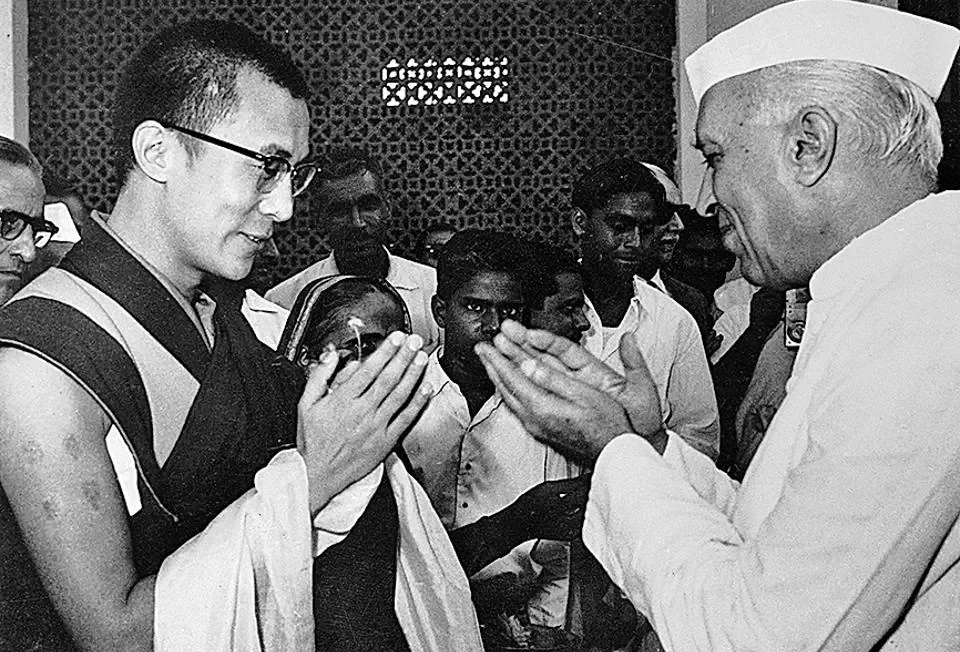Nehru Wanted Tibet, a peaceful neighbour to be erased


I [Sardar Patel] have been eating my heart out because I have not been
able to make him [Nehru] see the dangers ahead. China wants to establish
its hegemony over South-East Asia. We cannot shut our eyes to this
because imperialism is appearing in a new garb…His courtiers are misleading him. I have grave apprehensions about the future.
— Durga Das, reporting his talks with Sardar Patel
On this Children’s day let’s talk about the blunder produced by Chacha Nehru finishing the legacy of centuries-old Tibetan empire.
China was forced to pay Tibet an annual payment after Tibetan King Trisong Dentsen’s victory over China in the eighth century. In order to stop their war, China and Tibet signed a treaty in 783 CE that established their respective boundaries and pledged mutual respect for each other’s territorial sovereignty. This truth is inscribed on the Jokhang temple’s still-standing stone monument at the entryway.
The inscription is written in Tibetan and Chinese.
Without even filing a protest at the UN, Nehru permitted Tibet, a peaceful neighbor to be eliminated as a nation, making our northern frontiers vulnerable and casting doubt on the destiny of the water supplies that originate in Tibet.
The Tibetan government voiced its opposition to Chinese aggression at the UN. However, Tibet was not a UN member, so the UN Secretariat just noted it as an NGO’s request. In a sense, their attraction was boxed in. Due to this disadvantage, Tibetans asked the Indian government to bring up the Tibet issue before the UN.
India, however, was unwilling to do so for fear of offending China. Regarding supporting our neighbor who had pleaded for support, we blatantly counseled the victim to seek a peaceful resolution with the aggressor China.
Even worse, India rejected the negotiations on the dubious pretext that India had received a note from China indicating that the issue will be settled peacefully when the Tibet appeal was brought up by others for consideration in the UN General Assembly on November 23, 1950!
Even though China had invaded Tibet, KM Panikkar, the Indian Ambassador in Beijing, went so far as to claim that there was no proof that Chinese troops were there and that objecting to China’s invasion of Tibet would paint China in a negative light, portraying it as an aggressor, which would hurt India’s efforts to secure China’s admission to the UN. The insane Nehru-Panikkar line was like that! It was proposed to sacrifice Tibet and our own interests in national security in order to aid China’s UN entry!
The Commonwealth delegation to the UN examined the prospect of taking combined action as no one was willing to sponsor the Tibetan petition. The Indian representative in the meeting stated that India did not want to bring up the Tibetan issue in the UNSC or support its inclusion on the agenda of the UN General Assembly.
The J&K issue, which was an internal affair for India, should never have been brought up at the UN by Nehru. However, despite the fact that Tibet was crucial to both India’s foreign security and the existence of a peaceful neighbor, Nehru declined to send the issue to the UN. Nehru behaved when he ought not to have, and he didn’t when he ought to have! Both of his decisions—to act or not to act—had terrible effects on India. The catastrophe of Nehru’s plan was on both Tibet and India.
Given Tibet’s crucial relevance, India ought to have done everything in its power to preserve Tibet’s continued independence. India did this, though? When Nehru stated in an interview with the United Press on November 1, 1950, “India has neither the resources nor the inclination to send armed assistance to Tibet,” and “We can’t save Tibet,” he appeared to wash his hands of the situation, which was crucial to India’s security, and to imply that there was nothing India could do other than engage in armed intervention, which India did not wish to do. However, there were many other things India could have very well done, other than that.
International pressure could have been able to stop China from annexing Tibet. Due to its complete commitment to the Korean War and the fact that its hold over the mainland was far from solid in 1950, China was in a precarious position. If India, the country that was immediately impacted and had inherited the treaty with Tibet from British-India, had taken the lead, there would have been strong worldwide sympathy for the cause of Tibet. The majority of the world’s nations opposed China’s assault, and they looked to India, the nation most directly impacted, to lead the way. Even if India didn’t want to get involved militarily, it could have at least supported other countries’ military efforts or attempted to stop China.
There were other additional measures India could have taken even if it lacked the military might to fight and stop China, like protesting at the UN, expressing disapproval, offering moral support to Tibet, mobilizing public opinion against Chinese actions; recognizing Tibet as an independent country; convince other countries to do the same; demand a plebiscite in Tibet to gauge public opinion; China had previously agreed to a plebiscite in Mongolia that resulted in that country’s independence; work to achieve Tibet’s complete independence through peaceful means. Even if it took decades for the end result to be favorable, at least there would have been hoping. Many nations would have backed India if it had taken the lead. In reality, many eventually passed UN resolutions in favor of Tibet that India, the impacted nation, did not support.
DISCLAIMER: The author is solely responsible for the views expressed in this article. The author carries the responsibility for citing and/or licensing of images utilized within the text.
